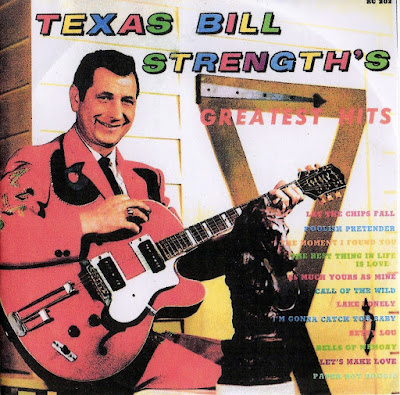Robert Lee Parker (August 31, 1937 – October 31, 2013) was an American blues-rock guitarist, singer, and songwriter and was one of the most exciting performers in modern blues, and arguably should have inherited the top blues spots left open by the unfortunate early passing’s of players like Albert King, Johnny "Guitar" Watson, and others. Parker could do it all: He wrote brilliant songs, he sang well, and he backed it all up with powerful, stinging guitar. The acclaim he received from fellow artists, critics, and fans was the result of years of hard work and struggle in the bars of Washington, D.C. and Virginia. Parker released two brilliant albums on the New Orleans' BlackTop label (distributed by Rounder), Shine Me Up (1995) and Bent Out of Shape (1993).
He was born in Lafayette, Louisiana but raised in Southern California after his family moved to Los Angeles when he was six. Going to school in Hollywood, the young Parker was bitten by the scenery, and decided he wanted to be in show business. At the Million Dollar Theater, he saw big stage shows by Count Basie, Duke Ellington, Billy Eckstine, and Lionel Hampton. Although he had an early interest in jazz, the blues resonated with him when artists like T-Bone Walker, Lowell Fulson, Johnny "Guitar" Watson, and Pee Wee Crayton came to town.
Parker began playing in the late '50s as a guitarist with Otis Williams & the Charms after winning a talent contest sponsored by West Coast blues and R&B legend Johnny Otis. Later, he backed Bo Diddley, and appeared with his band on The Ed Sullivan Show before joining the touring big band of Paul "Hucklebuck" Williams. His first solo single, "Blues Get Off My Shoulder", was recorded in 1958, while he was still working primarily with Williams' band. The B-side, "You Got What It Takes", also written by Parker, was later recorded for Motown by Marv Johnson, but with the songwriting credited to Berry Gordy, Gwen Fuqua, and Roquel Davis.
Parker told the Forgotten Hits newsletter in 2008: I wrote 'You've Got What It Takes,' that was MY song. Even had the Paul Hucklebuck Williams band playing on it behind me... And then Berry Gordy just stole it out from under me, just put his name on it. And what could I do? I was just trying to make a living, playing guitar and singing, how was I going to go on and fight Berry Gordy, big as he was, and Motown Records? There wasn't really nothing I could do about it - it was just too big and I didn't have any way to fight them.” Parker also performed frequently at the Apollo Theater in Harlem, and in the late 1950s toured with Chuck Berry, Buddy Holly, and Little Richard. He settled in Washington, D.C. in the '60s, dropping out of Williams' band and making a go of it on his own.
Parker was perhaps best known for his 1961 song "Watch Your Step," a single for the V-Tone label that became a hit on British and U.S. R&B charts. His song was later covered by several British blues bands, most prominent among them the Spencer Davis Group. The song's guitar riff inspired the introduction to the Beatles' 1964 hit single "I Feel Fine", and, according to John Lennon, also provided the basis for "Day Tripper". In relation to the Beatles' use of the riff, Parker said: "I was flattered, I thought it was a cool idea. But I still had, (in the) back of my mind, (the idea) that I should have gotten a little more recognition for that." Led Zeppelin also used the riff as the basis for their instrumental "Moby Dick".
And though he didn't become a name as familiar to blues fans as say, Eric Clapton or B.B. King, he was been cited as a major musical influence by Davis, John Mayall, Robin Trower, Clapton, Jimmy Page, drummer Mick Fleetwood, John Lennon, and most importantly, Carlos Santana. Parker's style was described by his protégé Bobby Radcliff as Guitar Slim-meets-James Brown, and that's not too far off the mark. In the summer of 1994, Santana was so happy about Parker's comeback on the BlackTop/Rounder label that he took him on the road for some arena shows on the East and West Coasts. "Carlos likes to tell people that he saw me playing in Mexico City when he was a kid, and that inspired him to pick up the guitar," Parker explained. Santana paid homage to Parker on his Havana Moon album, on which he covered "Watch Your Step." Dr. Feelgood also covered the tune in the '70s.
Parker remained an important player on the blues circuit for years, and was a regular performer in the Washington, D.C. area and at blues festivals in both the U.S. and Canada. He cut a swaggering figure on stage with his preacher-like exhortations to “say yeah, children,” his shiny suits and his lacquered, James Brown-style hairdo. His tenor voice both caressed and screamed the blues over his powerful, stinging and sometimes over-amped lead guitar. And he loved to walk the bar or walk through the crowd as he worked the strings. Unlike so many other blues musicians, Parker's live shows were comprised almost entirely of his own songs; he played very few covers.
"Unless the music of the day has some kind of substance to it, the blues always comes back," Parker said, adding, "I think Stevie Ray Vaughan had a lot to do with bringing the blues to white audiences, and Z.Z. Hill helped bring the Black audience back to the blues." Bobby Parker died of a heart attack on October 31, 2013; he was 76 years old.
(Edited from
AllMusic, Wikipedia & The Washington Post)














.jpg)




















.jpg)



















